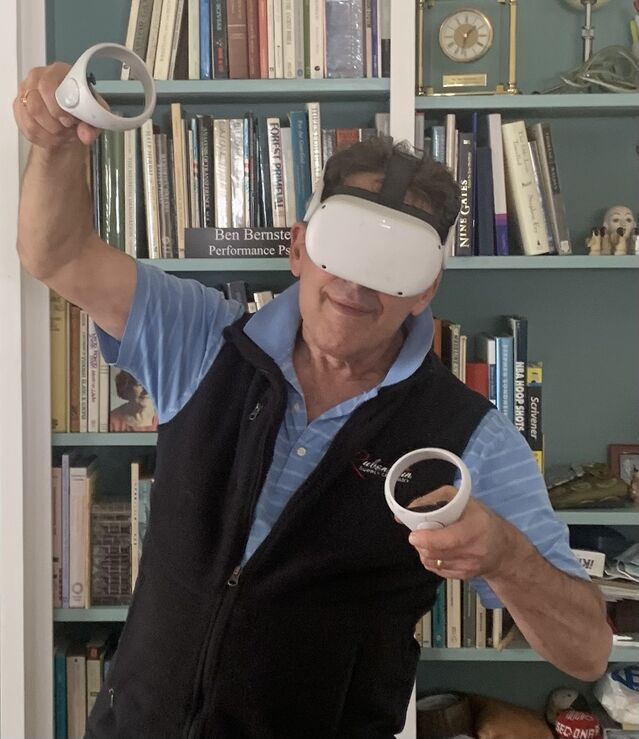Dopamine
Keep Talking and Nobody Explodes: A Boomer Gaming in VR
There’s more to his world than headsets, controllers, and exploding bombs.
Posted November 19, 2022 Reviewed by Vanessa Lancaster
Key points
- Video games and VR experiences cause dopamine to surge in the brain.
- Dopamine causes you to feel pleasure, satisfaction, and motivation.
- School may be a less attractive than video games and VR experience to teenagers because it doesn't cause dopamine surges.

When I scheduled a play date with my 15-year-old cousin, I was specific: “Bring your VR headset. I want to see how it all works.” At 74, I’ve had very limited exposure to virtual reality, and I know this kid is totally addicted.
He gets us into a game right away: one player wears the headset and holds the controllers in his hands. Once in the VR world, he’s in front of a large bomb that will explode in five minutes unless he defuses it. The other player (not wearing a headset) reads the instructions for defusing the bomb. The instructions are very complicated—there are many different parts to the bomb: colored wires that need to be cut, switches that need to be turned off, and buttons that need to be pressed. The clock is counting down. If you don’t defuse the bomb in time, it explodes, and you blow up with it.
I put on the headset, listening as my cousin (I’ll call him “the kid”) gives me basic instructions on how to use the controllers. The clock starts ticking. Oh wow. I see the bomb! It’s the big blocky thing with all kinds of stuff on it. The kid is firing off instructions, “Cut the blue wire!”
At first, I don't see a blue wire, but when I do, I immediately run into a snag with the controllers. I can't transmit fast enough the verbal instructions to my fingers. I get a few directions right, but I realize I am so scared about blowing myself up that I tear off the headset and stop the game at the four-minute mark. We try it again and twice more I get so charged with anxiety I stop before the big explosion. On the fourth attempt, I realize, I’m not really going to blow up. This is virtual reality. Face the fear! I’m the Stress Doctor! I take deep breaths and try to follow his instructions, but my awkward maneuvers cause the stupid bomb to slide off the table and fall on the floor. Dang! BOOM!
While my physical body doesn't shatter into a million shards, and my VR body doesn't pixelate into a billion dots, I find myself laughing hysterically while the kid rolls his eyes and makes a snide remark, “Boomers!”
I can't help but notice how amped up I feel. I'm so high! This is the same feeling I had fifty years ago when I used drugs.
Now, I just want to play again.
The kid and I go out for burgers. I ask him how he's doing in school. He rolls his eyes. I asked him what that means. “I’m not doing well,” he says, averting his gaze. “I don’t do my homework.”
“Let me guess," I said, "the homework is very boring.” He shot back, “School is very boring.”
There you have it. What can compete with mainlining your neurons with floods of dopamine induced by playing in the VR and video game world? Dopamine causes you to feel pleasure, satisfaction, and motivation. A surge of dopamine makes your brain feel good, like you've achieved something. Geometry, nouns, adjectives, and the War of 1812 don’t stand a chance.
The kid’s parents think he's ADHD. He’s not. The virtual world completely traps his attention. This adds another layer to why ADHD is all too often a misdiagnosis, if not a bogus one, for teenagers. (See my previous post, What's the Real "Deficit" in ADHD?).
My hangout with the kid revealed another layer of attention issues: difficulty in paying attention to anyone else. As we chomped on our burgers and slathered our fries with ketchup, the kid spoke about himself, continuously, with remarkable ease. He showed little to no interest in me.
In the competitive virtual world, you are either in opposition to everyone else or you are on a team that is besting or obliterating other teams. Sure, there are virtual experiences that are about building cooperation and community, but these are not the ones that hook teenagers.
The game we played was called, Keep Talking and Nobody Explodes. Sadly, I can imagine a second or third-generation iteration called Keep Playing and Everyone Implodes.
Then, as we bicycle home, a curious thing happens. Out of the blue, the kid asks, “Ben, are you religious?”
Wow, There’s more to his world than headsets, controllers, and exploding bombs. A ray of hope!
Although we made plans to work on this article together, I was quickly lost in the kid’s rear view mirror once he re-entered the VR world. I guess I’ll just have to wait till the next time the headset is down to have that conversation about religion.


